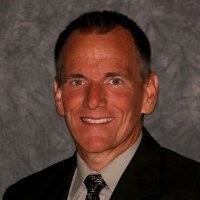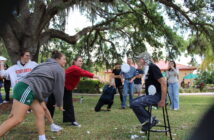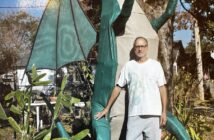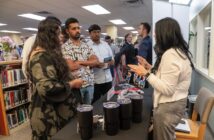[tribulant_slideshow gallery_id=”55″]
By Cristian Martinez
There are many professors here at Saint Leo University, and there are countless others that teach at the Saint Leo Centers, but there are few teachers that have done both.
One of the professors who does such a thing is Assistant Professor Robert Sullivan, a professor who teaches Criminal Justice with a focus in Homeland Security. He was a teacher for the Centers for four years before becoming a full-time instructor at the University Campus. Sullivan had worked for a few Saint Leo Centers across the nation: Tampa, Little Creek Naval Amphibious Base, and Chesapeake, VA; Sullivan became a professor on University Campus after the resignation of Dr. Matteson.
One of the differences Sullivan noticed between the Centers and University Campus was the students.
“There is quite a difference,” he said. “The average age of a center student is 36. Most have full-time jobs and come to class at night after work. They eat a bag of chips during class for dinner and look to you to make their night rewarding. They have family, work, and financial issues as well as the challenge of doing well in their studies. Campus students typically don’t have outside jobs, traffic jams on their way to class, or have to miss many meals. Their job is to come to class prepared and ready for some academic rigor. Not saying that they do not have stressors, but theirs are different than the traditional center student.”
Sullivan has faced difficulties with transitioning from teaching at the centers to teaching on University Campus.
“I really like campus,” said Sullivan. “But…I have made some quality relationships with my students in Tampa and Virginia and now I am not able to see those students through to graduation.”
Another difficulty Sullivan is facing is adjusting to the class schedule at University Campus.
“I am accustomed to teaching classes that are 5 hours long so transitioning to an hour and twenty minutes, twice a week, has been interesting but fun. But, I love campus kids. Our campus students are uniquely inquisitive, charming, incredibly polite, and focused on success. They totally energize me,” said Sullivan.
Sullivan is a conscientious teacher and shows nothing but support for his students and his fellow staff members; he always offers to help students if they are ever in trouble or if they don’t understand something. He never shies from a student’s questions, and rather enjoys when students ask more and more questions about his teaching topics. He claims that his experience here at the University is certainly a memorable one.
“The University is its own city designed for learning, playing, experimenting, growing, and development of body, mind, and spirit,” said Sullivan. “You really cannot replicate the campus environment. Centers are similar to community college models wherein you come to class, perhaps collaborate and visit with friends in the student lounge, then go home. Don’t get me wrong, our centers are gorgeous and well-staffed, but cannot really compete with the campus environment for the overall experience.”
Sullivan also explained some of the technological differences in the classrooms at the Centers and at University Campus.
“Let’s just say that many of the centers have differing types of technology. There can be some techno challenges with some of the military centers where we have to share classrooms with the Army, Navy, or Air Force. The same with our centers on state colleges,” said Sullivan. “Our stand-alone centers have pretty much the same technology as campus. I will say though, it is very nice to have UTS two buildings away when you are having a Smart Board issue!”
Sullivan commented on how happy he was to experience this new environment, how blessed he felt to be able to teach for Saint Leo, and how excited he was to see where this new adventure would take him and to see how he would grow from this. And his excitement shows when he teaches in his classroom.
Sullivan seems passionate and knowledgeable about what he teaches, as evidenced in his Intro to Homeland Defense class. Also, his passion and the way he interacts with his appear to rub off on the students as they listened and took notes from his presentation.
There are many professors here at Saint Leo University, and there are countless others that teach at the Saint Leo Centers, but there are few teachers that have done both.
One of the professors who does such a thing is Assistant Professor Richard Sullivan, a professor who teaches Criminal Justice with a focus in Homeland Security. He was a teacher for the Centers for four years before becoming a full-time instructor at the University Campus. Sullivan had worked for a few Saint Leo Centers across the nation: Tampa, Little Creek Naval Amphibious Base, and Chesapeake, VA; Sullivan became a professor on University Campus after the resignation of Dr. Matteson.
One of the differences Sullivan noticed between the Centers and University Campus was the students.
“There is quite a difference,” he said. “The average age of a center student is 36. Most have full-time jobs and come to class at night after work. They eat a bag of chips during class for dinner and look to you to make their night rewarding. They have family, work, and financial issues as well as the challenge of doing well in their studies. Campus students typically don’t have outside jobs, traffic jams on their way to class, or have to miss many meals. Their job is to come to class prepared and ready for some academic rigor. Not saying that they do not have stressors, but theirs are different than the traditional center student.”
Sullivan has faced difficulties with transitioning from teaching at the centers to teaching on University Campus.
“I really like campus,” said Sullivan. “But…I have made some quality relationships with my students in Tampa and Virginia and now I am not able to see those students through to graduation.”
Another difficulty Sullivan is facing is adjusting to the class schedule at University Campus.
“I am accustomed to teaching classes that are 5 hours long so transitioning to an hour and twenty minutes, twice a week, has been interesting but fun. But, I love campus kids. Our campus students are uniquely inquisitive, charming, incredibly polite, and focused on success. They totally energize me,” said Sullivan.
Sullivan is a conscientious teacher and shows nothing but support for his students and his fellow staff members; he always offers to help students if they are ever in trouble or if they don’t understand something. He never shies from a student’s questions, and rather enjoys when students ask more and more questions about his teaching topics. He claims that his experience here at the University is certainly a memorable one.
“The University is its own city designed for learning, playing, experimenting, growing, and development of body, mind, and spirit,” said Sullivan. “You really cannot replicate the campus environment. Centers are similar to community college models wherein you come to class, perhaps collaborate and visit with friends in the student lounge, then go home. Don’t get me wrong, our centers are gorgeous and well-staffed, but cannot really compete with the campus environment for the overall experience.”
Sullivan also explained some of the technological differences in the classrooms at the Centers and at University Campus.
“Let’s just say that many of the centers have differing types of technology. There can be some techno challenges with some of the military centers where we have to share classrooms with the Army, Navy, or Air Force. The same with our centers on state colleges,” said Sullivan. “Our stand-alone centers have pretty much the same technology as campus. I will say though, it is very nice to have UTS two buildings away when you are having a Smart Board issue!”
Sullivan commented on how happy he was to experience this new environment, how blessed he felt to be able to teach for Saint Leo, and how excited he was to see where this new adventure would take him and to see how he would grow from this. And his excitement shows when he teaches in his classroom.
Sullivan seems passionate and knowledgeable about what he teaches, as evidenced in his Intro to Homeland Defense class. Also, his passion and the way he interacts with his appear to rub off on the students as they listened and took notes from his presentation.





